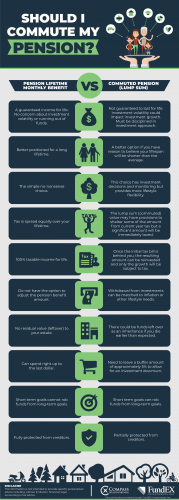
In years past, when an individual was preparing for retirement or leaving their employer for another job, it was commonplace that they would leave their defined benefit pension entitlement with their previous employer with the understanding that they would receive a monthly pension in retirement. Yet in recent years, there are a number of factors which have ‘flipped the script’ on the pension decision. Today, many employees are giving serious consideration as to why they may consider commuting their company pensions. However, there still remains no one-size-fits-all solution to this highly significant financial decision. So why are employees all of a sudden considering to commute their pensions?
Consider first that the current interest rate environment of low rates is prime for a healthier commuted pension value. The Bank of Canada’s 5-year bond yield is often the number used to help calculate your commuted pension value, according to a recent Financial Post article. Low rates equal greater commuted pension entitlements. So members of defined-benefit pension plans have been increasingly considering the trade-offs of commuting their pension versus taking the traditional monthly pension in today’s interest rate environment.
The second factor to consider is the fact that there is a growing existence of underfunded public and private sector pension plans. The C.D. Howe Institute has well documented (for many years now) the underfunded nature of the pension entitlements for Federal public servants. In the private sector, a recent report by the Canadian Centre for Policy Alternatives notes that many of Canada’s biggest companies have seriously underfunded their pension plans in exchange for paying out higher dividends to shareholders. With recent high profile cases like Sears Canada, where individuals lost some or all of their hard earned pensions, all of a sudden, the pension picture isn’t so rosy. There is legitimate fear on the part of Canadians of losing their career earned entitlements.
I’ve decided I want to retire – what should I do?
When you make the decision to consider retirement, your employer’s pension plan will normally put together an information package for you to consider. This is sometimes referred to as a “statement of options”. Depending upon the type of program you belong to, the options will differ. If you belong to a define contribution or money purchase plan, the decision is fairly straightforward. The full market value of your plan will normally qualify for transfer to a personal locked-in retirement account. However, if you belong to a defined-benefit plan, your options won’t be so straightforward.
Before making any decisions, I strongly suggest getting some proper advice from a Financial Advisor or Financial Planner. Yes I’m biased – this is the very trade that I practice each and every day. But really, I feel strongly that everyone should do this before making one of the biggest financial decisions of their lifetime. A Financial Advisor will help you review your options so that you can make the best decision that fits your unique and personal circumstances. At this stage, hopefully you’re beyond the point of asking yourself “How much money do I need to retire?” If not, a Financial Advisor will also help you establish some goals and objectives and whether or not you can put a realistic plan together. They will also help you answer the question, “what is the best way to invest my money?” if you decide to commute your pension entitlement.
Here are some of the pros and cons of taking your pension versus commuting your pension. See below:
PENSION LIFETIME MONTHLY BENEFIT:
- A guaranteed income for life. No concern about investment volatility or running out of funds.
- Better positioned for a long lifetime.
- The simple no-nonsense choice.
- Tax is spread equally over your lifetime.
- 100% taxable income for life.
- Do not have the option to adjust the pension benefit amount.
- No residual value (leftover) to your estate.
- Can spend right up to the last dollar.
- Short term goals cannot rob funds from long-term goals.
- Fully protected from creditors.
COMMUTED PENSION (LUMP SUM)
- Not guaranteed to last for life. Investment volatility could impact investment growth. Must be disciplined in investment approach.
- A better option if you have reason to believe your lifespan will be shorter than the average.
- This choice has investment decisions and monitoring but provides more lifestyle flexibility.
- The lump sum (commuted) value may have provisions to shelter some of the amount from current year tax but a significant amount will be immediately taxed.
- Once the initial tax bill is behind you, the resulting amount can be reinvested and only the growth will be subject to tax.
- Withdrawal from investments can be matched to inflation or other lifestyle needs.
- There could be funds left over as an inheritance if you die earlier than expected.
- Need to leave a buffer amount of approximately 5% to allow for an investment downturn.
- Short term goals CAN rob funds from long-term goals.
- Partially protected from creditors.
Source: Moneysense Magazine
In the end, deciding what decision to make when faced with the option to commute your pension is a major financial decision that should not be taken lightly. Make sure you consult with a professional who will help you understand how your decision fits within your overall retirement plan.
To receive your FREE Pension Review CLICK HERE or contact our office at info@compasswealthpartners.ca or call us at (905) 430-8099.
Authored by Isaac Musial (Financial Advisor) July 27, 2018
Isaac Musial is Partner & Wealth Advisor at Compass Wealth Partners, a Durham Region based financial services company located in Oshawa, ON. The foregoing is for general information purposes only and is the opinion of the writer. This information is not intended to provide specific personalized advice including without limitation, financial, legal, accounting or tax advice.
